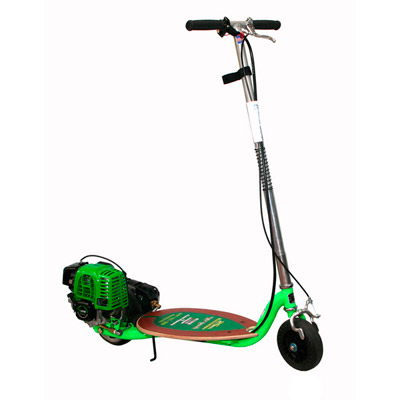Time to scoot
January 1, 2011 By: Craig Webb LPGas
Propane-fueled scooters capture consumers’ interest, experience 52 percent jump in sales in recent months
His love of the seas fostered a passion for propane. And now as the head of LEHR, the California-based company he founded, Bernardo Jorge Herzer is charting a new course of innovation for consumer-friendly uses for propane.
The company that has been recognized for its past endeavors of manufacturing everything from lawn trimmers to leaf blowers to lawn mowers powered by small propane canisters is now setting its sights on other uses of its eco-friendly technology.
One such use, which has caught the attention of the industry and consumers alike, is two-wheeled, propane-powered scooters. The company has dabbled in propane-powered scooters for a few years, but in recent months has gained a lot of traction in the field.
Herzer points out that the two-wheeled scooters have experienced a 52 percent jump in sales in just the last seven months. And this growth comes amid a regulatory environment in which scooters are banned in many communities out of perception that they are toys for teens rather than a viable means of transportation for adults.
Clearly, the consumers are interested in cheaper and greener modes of transportation, Herzer says, yet lawmakers are placing restrictions on their use.
“Innovation comes from thinking outside of the box,” he says. “These regulations are so broad they are essentially outlawing the use of two-wheeled scooters. It hinders innovation.”
Among the latest scooters to feature a LEHR propane engine is one offered by Patmont Motor Werks to mark that company’s 25th anniversary.
The Patmont scooter utilizes 16.4-ounce propane canisters commonly sold in hardware stores and camping outlets.
The scooter’s 25.4cc single-cylinder, air-cooled, 4-stroke engine boasts an estimated fuel economy rating of 100 miles per gallon. It can idle on one canister for up to nine hours and run full-throttle at a speed of 21 mph for almost two hours.
Aside from amazing mileage, Herzer says, what he and consumers find attractive about the propane-powered scooters is the fact they are virtually emission free. Since the fuel is sealed in canisters at all times, the scooters offer zero evaporation emission.
Unlike their gas-powered counterparts, which release emissions from the time the gas is channeled from the gas pump into the gas can then to the scooter, Herzer says, the propane units are about as green as it gets – short of foot power. And it’s a lot quieter too.
“There’s no high whining sound like that of the two-stroke engine,” he says.
This sensitivity to environs is what attracted Herzer to propane in the first place. His lifelong interest in the fuel was spurred back when he wore a very different cap – that of a sea captain.
Working in the North Sea aboard the research vessel “Sea Surveyor,” a young Herzer grew tired of the constant hum and fumes from generators and other motors aboard. He wondered why the machines aboard the vessel could not be powered by clean-burning propane used by the ship’s galley stove.
Propane-powered generators and other equipment were available for industrial users but not commercially available for the common folk. After a couple of years of research and tinkering, Herzer had secured his first patents for smaller propane-powered engines.
This germ of an idea led to the creation of LEHR, which bills itself as working to make more consumer-friendly, environmentally friendly engines and products.
The company has become the darling of the propane industry, winning accolades from the Environmental Protection Agency (EPA), the California Air Resources Board and the Propane Education & Research Council (PERC).
In May 2009, the company received a Clean Air Excellence award from the EPA and the Clean Air Act Advisory Committee for its hand-held propane grass trimmer for home use. And in August, PERC highlighted LEHR’s string trimmer, leaf blower and a mower at the Northeast Propane Show.
In June, LEHR announced that it had licensed the technology behind its propane-powered garden equipment to Fiskars.
Herzer says this doesn’t mean his company is done pushing the technological envelope.
“We will be coming to the market with more products in 2011,” he says.
Engineers in the company’s research and development departments are hard at work on the latest in environmentally friendly products – and these will include propane.
“It is an amazing fuel,” Herzer says. “I believe this nation is moving toward a gaseous fuel economy.”
Since propane powers everything from buses to forklifts, he sees no reason why propane-powered vehicles cannot be manufactured for the masses. And the two-wheeled scooters are just a start, Herzer says. One day, he expects people to tool around on everything from full-size, propane-powered vehicles to “motorcycles to bicycles.”
“We are developing technology to bring it down to the consumer level,” he says.
So for now, Herzer says, he has to be content riding on his own fleet of propane-powered scooters that range from those already on the salesroom floor to those only found in the lab.
“I would compare a good scooter to surfing,” he says. “It is like a surfboard on wheels. It is like catching the perfect wave.”
